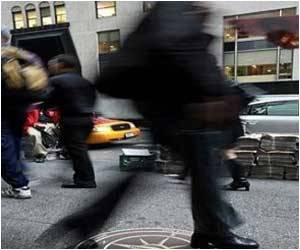Mumbai’s Inorbit shopping mall opens at 5 in the morning, but not for shoppers.

"The walk makes me feel energetic and sets me up for the day," said Ravi Wikar, whose daily constitutional takes him on a circular route past shuttered shops and up and down the switched-off escalators.
"I walk every morning from 6:30 am and do about three kilometres (1.9 miles) on average," the 37-year-old businessman, dressed in a white baseball cap, white t-shirt, red tracksuit bottoms and running shoes, told AFP.
The concept of using a closed shopping centre as a place to exercise doesn't seem strange to the 50 or so regular mall walkers of Malad, most of whom are senior citizens with ailments from arthritis to diabetes.
It's born out of necessity.
India's financial and entertainment capital is chronically congested.
Roads and pavements are poorly maintained, while daily traffic gridlock combines with extreme heat and humidity to push up smog and pollution levels.
In contrast, the smooth surfaces of the shopping centre aisles and flat, tarmac car park are less stressful on ageing joints than the often rutted, undulating tracks of nearby public parks.
"Someone can pick you up afterwards but if you go to the parks, they can't," said Ranjan Kar, a retired media executive who is Wikar's walking partner.
The walkers also say that with lighting and security guards everywhere -- anyone walking inside the centre still has to go through a metal detecting arch and be searched -- it's also safer.
"Walking on the roads... there's bad people also," said Wikar, fingering the gold neck chain under his t-shirt. "It's possible you can get mugged."
"It's calm and quiet and there's no fumes from the cars," added retired draftsman Prabhakar Kishambare, 70, who typically does three to four laps around the car park every morning.
"It's an open space, nice and clean and the ambience is very good."
For Neera Punj, convenor of the Citizens' Forum for the Protection of Public Spaces or CitiSpace, the emergence of mall-walking sums up the problems facing Mumbai.
"The state of the remaining open spaces is deplorable," she said. "That's why we're getting to the point where we're getting mall-walkers."
CitiSpace says that there are just 940 acres (380 hectares) of parks, recreation grounds and gardens for an official population of about 14 million.
The unofficial population is thought to be over 18 million -- more than in The Netherlands as a whole
In comparison, London, with nearly eight million people, has more than 10,000 acres of publicly-accessible open space while New York City has some 29,000 acres for about the same number of residents.
"It's miniscule compared to what the national building norms recommend," said Punj. "It recommends four acres for every 1,000 people but what we have is 0.03 acres.
"Space isn't a luxury. It's absolutely mandatory and essential for a person's well-being."
CitiSpace aren't the only ones with concerns about disappearing open spaces and its effect on people's health, fitness and well-being.
Global consultancy Ernst and Young said in a report published last year that the lack of space to play sports in India's cities was a factor in the nation's lack of international success in sports other than cricket.
Less than five percent of the country's vast population of 1.21 billion had access to sporting facilities and organised sports, the study said.
Sports facilities do exist but usually in private clubs. Like so much in India, access depends on ability to pay, forcing the majority to make do with sub-standard facilities or none at all.
Punj doesn't dismiss the mall-walkers out of hand, though, instead seeing the initiative as a resourceful way of using a public space -- and part of a canny marketing strategy.
The mall-walkers, meanwhile, are just happy to have found a suitable place to stretch their legs in relative comfort.
"I've been doing this (walking in the morning) since 1984 in different places. Now I'm doing it here," said Kishambare. "You can always find somewhere."
There are also other advantages, said Wikar with a smile.
"It's a good way to go window shopping."
Source-AFP
 MEDINDIA
MEDINDIA



 Email
Email




